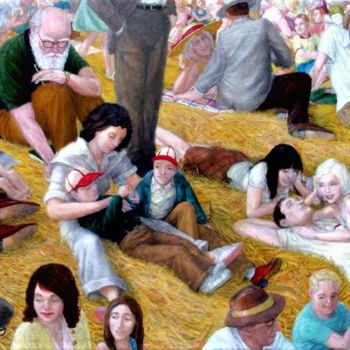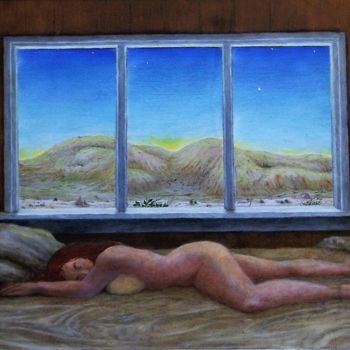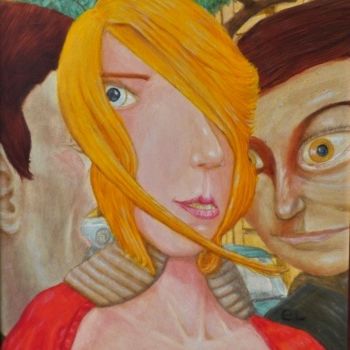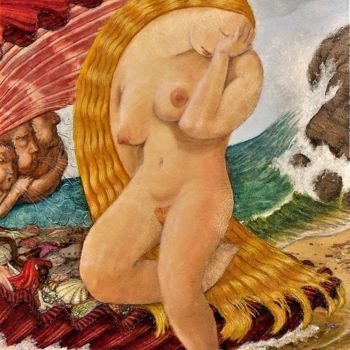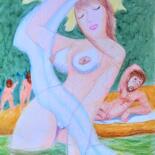Venus Emerges (2022) Tekening door Edwin Loftus
Meer info
- Verpakking (Envelop) Alle kunstwerken worden verzonden met een premium carrier, zorgvuldig beschermd en verzekerd.
- Tracking Opvolging van de levering tot aan de bezorging bij de koper. Er wordt een tracking nummer verstrekt zodat u het pakket in real-time kunt volgen.
- Vertraging Wereldwijde levering in 3 tot 7 dagen (Schatting)
Meer info
- Volgbaar online certificaat van echtheid Echtheidscertificaten kunnen op elk moment online worden geverifieerd door de code van het kunstwerk te scannen.
- Certificering van de Kunstenaarswaarde De experts bestuderen het werk en de carrière van een kunstenaar om een onafhankelijke en vetrouwbare gemiddelde waarde vast te stellen. De gemiddelde waarde stelt de kunstenaar in staat zich voor een bepaalde periode in een prijsklasse te plaatsen. Ook kan aan de deskundige gevraagd worden om een precieze schatting te geven voor een specifiek werk.
Meer info
100% veilig betalen met SSL-certificaat + 3D Secure.
Meer info
Deze print is verkrijgbaar in verschillende maten.
Verkoper Edwin Loftus
Deze afbeelding is beschikbaar als download met licentie
Verkoper Edwin Loftus
-
Origineel Kunstwerk (One Of A Kind)
Tekening,
Pastel
op Karton
- Dimensies Hoogte 14in, Breedte 11in
- Staat van kunstwerk Het kunstwerk is in perfecte staat
- Framing Dit kunstwerk is niet ingelijst
- Categorieën Tekeningen onder US$ 5.000 Symboliek
In most ancient civilizations of which we have written records, males were the economic and political center of the family and social order. Views differed greatly from culture to culture, but women, were often viewed as a form of inferior part of humanity, entitled to protection, sometimes with very important rights that verged on superiority in the right settings, but often as possessions of the males with authority over them. Systems equivalent to bride prices and dowries existed around the world.
A bride price, is the sales value of a daughter, usually paid to her father for the right to make her a man's wife. This doesn't mean that a daughter did not have value as a family member and as a person. in fact, for those reasons and her value as a worker in the household and business, fathers, as the controllers of the household, were considered to be owed compensation for the loss they would incur. The family was still likely to take into account the ability of the payee to provide a secure home for their daughter and to treat her humanely. A man of ill-repute might well be turned down, even if he exceeded the bride price asked.
A dowry is the treasure a daughter brings with her as her own possessions and sometimes a sweetener to the exchange of custody. A wealthy daughter's dowry might include large sums of cash and land of economic value. Dowries might be frittered away, but they have often been the property of the wife, protected in case of divorce or inheritance disputes upon the husband's death. A second form of dowry is the 'bride price' a father pays the husband and his family to take on the expense of keeping his daughter. Failure to pay as promised or paying what the family thought too little could place the bride in jeopardy of being cast out or killed.
A third form of bride selling were marriages of alliance. The joining of two families' bloodlines could form a bond of cooperation or non-aggression, the latter particularly of interest to kings and their kinfolk.
In this sort of context and its many variations, romantic interest was expected to result from the marriage, rather than the other way around. And of course, there were many instances of romantic attractions forming between persons other than the person's spouse.
Romantic love was a plus when it occurred between married people, and a bane to social order otherwise, particularly when it led to infidelity and either the production of unwanted children or interfered with the production of heirs. In Europe the rebirth of importance of romantic love began during the Renaissance and into the Enlightenment, generalized through the media of songs, plays, and romantic literature, the mass-media of their day.
Plays like, Romeo and Julliet, were slightly scandalous and very appealing because exposed the alternative and its potential tragedy in a world in which The Taming of the Shrew was just as understandable. Even today, there are countries where bride-selling and dowries that purchase the security of the bride are still practiced and there are those among us that believe couples should be matched based on economic or genetic characteristics. Over the last few decades dozens (or more) movies have been released based on the premise that if someone doesn't get married soon, they'll lose their inheritance. These films are successful because the person they choose as a fake spouse always ends up being their true romantic partner, but the interesting thing is that such stories stand so perfectly with one foot in the pre-romantic era and one foot in the romantic era, and people all over the world accept the premise, because those people are rich and have so much more riding on such things, (no one cares if a pauper or middle-class shop owner's son is denied their inheritance).
A few centuries of infatuation with romance is far from a foundation for an argument that the world has changed. But a few millennia of romantic tales that excite our imaginations and yearnings are an argument for a benefit to be had if and when such a change occurs.
My personal belief is that mutual sexual attraction and mutual romantic attraction are like the two ends of an arrow. The "point" of sexual attraction leads us there and enables us to stick with our target. But the fletching of romantic attraction is what guides us to the right target and the part that remains visible long after the point has done its job.
That is why I have done so many drawings on this subject and tend to mix sex and the potential for love in them. Like Jack and Jill, they'll go up the hill and will either return with a pail of water between them or will come tumbling down.
Verwante thema's
Edwin Loftus is een Amerikaanse schilder en tekenaar geboren in 1951. Zijn interesse in kunst begon op 4-jarige leeftijd toen hij besloot iets echts te tekenen in plaats van te werken vanuit zijn verbeelding.
Als kind blonk hij uit in tekenen en als tiener begon hij te experimenteren met olieverf. Op de universiteit volgde hij cursussen kunst en kunstgeschiedenis en realiseerde hij zich dat ware kunst niets te maken had met de kwaliteit van het tekenen of schilderen, maar dat het de ambitie moest hebben om de grenzen te verleggen en de visuele ervaring te vergroten.
Hij studeerde ook filosofie, psychologie en geschiedenis en realiseerde zich al snel dat het gewoon een andere kunstinstelling was die zijn elitaire industrie en beloningssysteem probeerde te verdedigen. Hun vaardigheden waren bijna onbestaande, ze wisten niets van psychologie, perceptie of stimulusrespons, en ze waren verlengstukken van het geloofssysteem dat communisme, fascisme en andere vormen van totalitarisme tot zulke vernietigende krachten in de wereld maakte. Ze geloven letterlijk dat kunst niet beschikbaar zou moeten zijn voor gewone mensen, maar alleen voor een elite die 'verfijnd' genoeg is om het te begrijpen.
Edwin Loftus realiseerde zich dat de keizers van de kunst geen kleren hadden, maar ze waren nog steeds de keizers. Begaafd in de kunst, werkte hij hard om deze vaardigheid te verwerven. Dus vond hij andere manieren om de kost te verdienen en verkocht hij af en toe een paar kunstwerken. Zestig jaar lang genoten veel mensen van zijn werken en sommigen verzamelden ze.
Vandaag is Edwin Loftus met pensioen. Zelfs als hij al zijn schilderijen zou verkopen voor de prijs die hij vroeg, zou 'kunstenaar' de laagstbetaalde baan zijn die hij ooit had... maar zo is het nu eenmaal. Het maakt hem niet meer uit nadat hij sterft. Hij hoopt alleen dat sommige mensen genoeg zullen vinden van wat hij doet om er in de toekomst van te genieten.
-
Nationaliteit:
VERENIGDE STATEN

- Geboortedatum : 1951
- Artistieke domeinen: Werken van kunstenaars met gecertificeerde kunstenaarswaarde,
- Groepen: Gecertificeerde artiesten Hedendaagse Amerikaanse Artiesten




